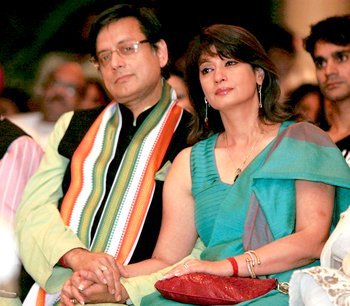New Delhi, Jun 30: Delhi Police’s Special Investigation Team (SIT), which is probing the murder of Sunanda Pushkar, is expected to conduct a polygraph or lie detector test on former union minister and Congress leader Shashi Tharoor, sources said.
 Sources said Delhi police may appeal in the court next week in this regard. Earlier this month, polygraph test of six persons closely associated with Tharoor was conducted in connection with the high profile murder case.
Sources said Delhi police may appeal in the court next week in this regard. Earlier this month, polygraph test of six persons closely associated with Tharoor was conducted in connection with the high profile murder case.
The test was conducted on Tharoor‘s domestic help Narayan Singh, his driver Bajrangi and his friend Sanjay Dewan.
This was done after metropolitan magistrate Sunil Kumar Sharma, during in-camera proceedings on May 20, allowed police to conduct the polygraph test on the three people after their consent.
Three other people – S.K. Sharma, Vikas Ahlawat and Sunil Takru – have also undergone the lie detector test in connection with the case.
“Our investigation is continuing. During investigation, whatever needs to be done will be done. So far, we have already carried out polygraph test on six people. If there is any requirement, we will conduct further tests,” Bassi had said, adding that, “Till the time we conclude our investigation, whatever is required will be done. The reports of the tests have not come yet.”
The sources said the test was conducted in the presence of the suspects’ lawyers.
Police had earlier questioned these six people.
During the polygraph test, over 100 questions related to some crucial facts, including injuries on Pushkar’s body, were asked.
All the suspects were asked about Tharoor’s relationship with Pushkar and Pakistani journalist Mehr Tarar.
“During the polygraph test, all the suspects also faced questions related to the IPL controversy, the couple’s trip to Dubai, and the constant fights between them,” a police officer had said on condition of anonymity.
Officers privy to the investigation said all the suspects were also asked about the couple’s fight a day prior to Sunanda’s death.
The messages recovered from Sunanda Pushkar’s mobile phone were also part of the questions, said the officer.
Pushkar, who married Tharoor in 2010, was found dead under mysterious circumstances inside a room at the Leela Palace Hotel in Delhi on January 17, 2014. Police registered a murder case on January 1, 2015.
Prior to her death, Pushkar was embroiled in a spat with Pakistani journalist Tarar, whom she accused of stalking her husband.





Comments
Add new comment